
Although we are now more used to the idea of lockdown, this third lockdown seems to be taking a heavier toll on the British public. So, how does this dwindling morale impact bottom lines and employees?
Alex Dunn, MD, Superstat
January got off to a flying start and, overall, top line sales have been holding up – albeit thanks to COVID products. Hopefully, sales of traditional products will start to come back but working from home is here to stay and that will have a long-term impact on our industry.
Dealers are a lot better prepared this time, but what seems to have knocked a lot of people for six is schools being shut again, and this time the workload is a lot more demanding; that’s really hard when both parents work. One thing scientists do know is that you can’t give your full attention to a Zoom and a five year old at the same time! Some working parents would rather be furloughed for a few weeks but, for many businesses, this just isn’t an option.
‘Lockdown three’ has caused a definite slowdown. We have also noticed that a lot of businesses have stopped doing any digital marketing at a time when communication is more important than ever. A lot of dealers are telling us that they have got salespeople on furlough who are looking for ways to keep their hand in and stay connected to the business world. People who have used things like online training courses have told us they were able to hit the ground running when called upon, whereas others have taken a while to get back up to speed.
Even those still working are under genuine stress, whether from an increased workload, reduced hours, lack of social interaction or balancing family commitments. Communication has definitely suffered; in the hustle and bustle of running a business it’s easy to forget just to keep in touch with people who are working remotely, or not working at all, and feeling isolated.
Dealer principals who normally pay themselves through dividends have fallen through a hole in the government’s aid package but, for most dealers, the bottom line has been saved by the furlough scheme. Whether you think the government acted too quickly, or too slowly, I think they have to be commended for getting something up-and-running so quickly. It has kept a lot of dealers in business.
One thing dealers have always shown is that they can innovate and react quickly to a changing situation, and they have proved this yet again.
Tim Beaumont, group MD, Nemo and Office Club
The first lockdown took us into the unknown; it was a shock, and businesses instinctively switched to emergency mode, setting about re-structuring the way they operate. The expectation was that it would only be for a relatively short period, but in that time they developed new, smarter ways of working; meetings switched to online; costs were stripped out (and not missed) and dealers pro-actively demonstrated the personal support they offered to customers.
As a group we dedicated time and resource to supporting dealers with sourcing new product ranges, deciphering government guidelines and providing new marketing tools for a new way of working so that, by ‘lockdown two’, businesses were much more prepared and seemed to take it very much in their stride, managing a balance of reduced costs and seeking out sale opportunities.
Maybe it was the thought of Christmas, and a hope that the end of 2020 would instigate the beginning of a rapid recovery, but the second lockdown was filled with optimism whereas ‘lockdown three’, in the heart of winter, has come as a real hammer blow to hopes of a quick exit.
Most businesses can adapt to change, and our industry has shown that extremely well with the seamless change of supply to PPE, infection control, social-distancing signage, increased demand for packaging supplies and adapting services to cater for the huge increase in homeworkers. However, the one thing business dislikes is uncertainty; lockdown three has brought uncertainty.
We still hold regular group online meetings with members to share experiences and support; the retail sector, in particular, is finding it incredibly difficult to plan their next move. After being shut down for so much of 2020, they are having to cope with almost zero income, unsold seasonal stock and the uncertainty of what our high streets will look like when we do re-open.
The true impact of the third lockdown is not going to be felt immediately. It is not just about being able to get sales back to where they were pre-COVID, the impact on the wellbeing of the working population will be the big story that unwinds over the coming months. There will be people who have not worked for 12 months facing the anxiety of going back to work; there will be those that have had to work tirelessly throughout the pandemic, who are mentally exhausted from the strain and, sadly, there will be those who find themselves without work when the furlough scheme comes to an end.
Looking further ahead there is every reason to remain optimistic about a fast and successful bounce back; the resilience shown by dealers, and their ability to adapt, has been quite spectacular – and although it might not seem it right now, that experience, and enforced scrutiny of their own businesses, will stand them in good stead for a return to more prosperous times.
Julie Hawley, MD, Office Friendly
‘Lockdown three’ has a very different feel to it this time with both positive and negative effects to consider. Office Friendly made a decision very early on in the pandemic to support the full supply chain for the benefit of dealers. The learning curve was steep for everyone; government support schemes, protection of the workforce at work or repositioning at home, measuring the drop in business, sourcing other products like PPE, understanding how and why to keep contact with customers and suppliers… not forgetting how to tackle the actual virus itself!
We have all gone through this learning curve and are in a much better place for it.
Frustrations are mounting, though, with this lockdown. Progress has been made with the virus, technology exists to track and trace it, regulations have been formulated for workplaces – yet the government struggles to implement many of these tools to enable us to return to a more normal life while dealing with the pandemic.
Mental health issues are commonplace now whether you are a business owner in survival mode or an employee trying to hold onto your livelihood while caring for the vulnerable, home schooling, or living with the effects of the pandemic. The seasonal effects of a bleak time of the year doesn’t help, nor does the prospect of leading a normal life being just out of reach at the moment.
The shape of the industry has been changed forever, and will continue to evolve as traditional supply chain relationships fragment and new relationships form through the necessity to survive. Products portfolios have been extended to include new categories, and the obsolete will accelerate as the need or ‘me too’ concept loses out.
We need to give reassurance that the horizon is coming into focus, and we have to find the resilience to work through the next couple of months. Seeing spring time as a mood-changer, and using the winter months for planning, will concentrate the mind on the fact that better times are ahead.
The hope is that government support packages will remain in place as business levels recover, and that these packages will assist in the repayment of loans or deferred payments. Many opportunities emerged over the last year, and those who are prepared to maximise the effect of these this year will recover sooner, and grow considerably.
Office Friendly continues to be strong and stable in this environment, with a keen focus on ensuring our members are well-supported within the supply chain through these next few months.



Be the first to comment